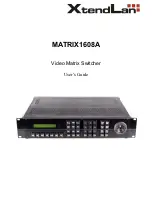
•
Dress the cables neatly with cable ties, using low to moderate pressure. Do not over tighten the
ties.
•
Cross-connect cables where necessary, using rated punch blocks, patch panels and
components. Do not splice or bridge the cable at any point.
•
Keep the UTP cable as far away as possible from potential sources of EMI, such as electrical
cables, transformers and light fixtures. Do not tie the cables to electrical conduits or lay the
cables on electrical fixtures.
•
Always test every installed segment with a cable tester. Toning alone is not an acceptable test.
•
Always install jacks so as to prevent dust and other contaminants from settling on the
contacts. The contacts of the jack should face up on the flush mounted plates or
left/right/down on surface mount boxes.
•
Always leave extra slack on the cables, neatly coiled in the ceiling or nearest concealed
location. Leave at least five feet at the work outlet side and 15 feet at the patch panel side.
•
Choose either 568A or 568B wiring standard before beginning. Wire all jacks and patch panels
for the same wiring scheme. Do not mix 568A and 568B wiring in the same installation.
•
Always obey all local and national fire and building codes. Be sure to firestop all the cables that
penetrate a firewall. Use plenum-rated cable where it is required.
Vertiv
| Avocent® AutoView™ 2108/2216/3108/3216 Switch Installer/User Guide |
58





































